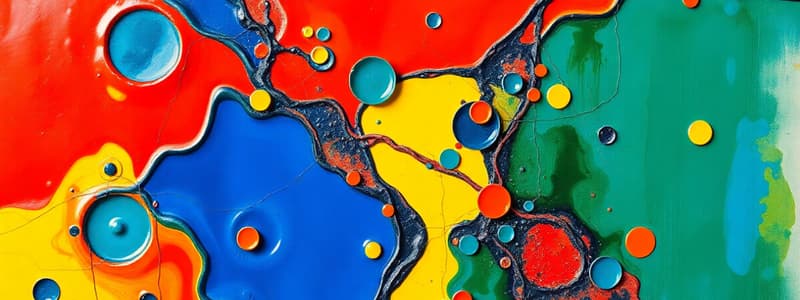Podcast
Questions and Answers
What is corrosion?
What is corrosion?
The tendency of metals to return to their original state as metal oxides.
Which of the following components are necessary for corrosion to take place? (Select all that apply)
Which of the following components are necessary for corrosion to take place? (Select all that apply)
- Anode (correct)
- Electrolyte (correct)
- Cathode (correct)
- Copper
What is an anode?
What is an anode?
The part/region of the metal where corrosion occurs.
What happens at the cathode during corrosion?
What happens at the cathode during corrosion?
What type of corrosion is characterized by local damage with small holes?
What type of corrosion is characterized by local damage with small holes?
Plastics corrode in the same way as metals.
Plastics corrode in the same way as metals.
What is the main environmental factor influencing pitting corrosion?
What is the main environmental factor influencing pitting corrosion?
Which of the following is NOT a type of corrosion mentioned?
Which of the following is NOT a type of corrosion mentioned?
Match the type of corrosion with its definition:
Match the type of corrosion with its definition:
Flashcards are hidden until you start studying
Study Notes
Corrosion Introduction
- Corrosion is a natural process where metals revert to their original oxide, sulfide, or other compound forms found in nature.
- The goal of corrosion is for metals to return to their natural state.
- Corrosion is an oxidation-reduction reaction involving oxygen gas (O2) to produce metal oxides.
- For plastics, corrosion is referred to as "degradation", which involves the breakdown of bonds between organic molecules.
- Plastics and ceramics generally do not corrode through electrochemical processes due to being poor electrical conductors.
Corrosion Components
- Anode: The area where corrosion occurs, releasing positively charged metal ions into the electrolyte. Oxidation (loss of electrons) occurs here.
- Cathode: The area where electrons flow, remaining protected and intact. Reduction occurs here.
- Electrolyte: A conductive solution facilitating ionic flow, such as moisture or salt solution.
- Electrical path: A connection between the anode and cathode allowing electron flow.
Corrosion Types
- Uniform Corrosion: A widespread attack across all exposed surfaces. It can occur through electrochemical processes or direct attack.
- Pitting Corrosion: Localized corrosion damage characterized by cavities or small holes on the surface.
- Crevice Corrosion: Localized attack within crevices formed between metal-to-metal or metal-to-non-metal surfaces.
- Galvanic Corrosion (Bimetallic Corrosion): Electrochemical corrosion occurring when two dissimilar metals are connected in an electrolyte. The less noble metal (anode) corrodes preferentially, accelerating its corrosion rate.
Galvanic Corrosion Conditions
- Electrochemically dissimilar metals must be present.
- The metals must be in electrical contact.
- The metals must be immersed in an electrolyte.
Studying That Suits You
Use AI to generate personalized quizzes and flashcards to suit your learning preferences.




